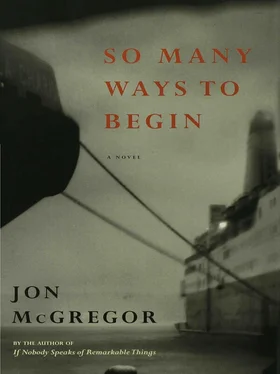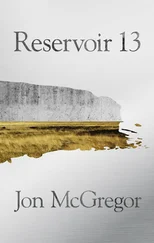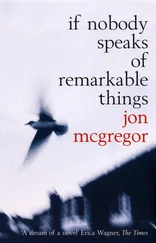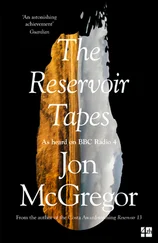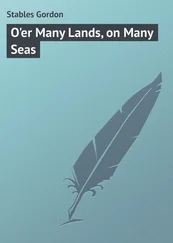A hospital admissions card, headed Royal London White-chapel, 29th March 1945.
Brisk blue handwriting, the details spread neatly across the dotted lines.
Mary Friel. D.O.B. 14.11.11. Maternity.
There was an address, a King Edward Avenue in St John's Wood, but it had been crossed out in red pen, the words prob. false written above it. And there was a signature, Mary Friel, the writing scratched and faltering, the e and the / of Friel falling beneath the dotted line.
He sat slowly on the chair by the small dormer window and looked at it for a long time in the failing evening light. He tried to convince himself that it was something other than what he knew it must be. He tried the name for size, and it felt heavy and alien on his tongue. Friel. David Friel.
He tried to imagine the young girl whose handwriting this was, and the much older woman she must have become. He traced the shapes of the letters with his thumb, hoping for more clues than those few words could give.
Friel.
He practised saying the name, whispering it to himself in that large bare room littered with piles of paper. He wondered why even the date of birth was uncertain. And the hunger came back once more, the hunger to know, the hunger that had never really gone away. Friel. Mary Friel. David Friel.
And someone might say, my God, I don't believe it, with the shock that comes from sudden recognition, from a memory abruptly refreshed. My God, where did you find this? Reaching out to touch it, mouthing the words written across it, saying, I never thought. I remember when. They said I couldn't, I couldn't. But however did you find it? someone might ask. I mean it could have been anywhere couldn't it? I wasn't really looking, he was going to say, smiling, shrugging, it was an accident more than anything.
An accident, like the Mildenhall ploughman tearing through thick frosty soil to haul out the treasured silver plates with his bare hands. An accident, like Julia's original slip of the tongue.
40 Scrapbook w/postcards, tickets, maps, etc., 1979
He stood out on the deck, watching the dockers wrestle the heavy mooring ropes into place around the bollards, watching the oily slip of water between the boat and the quay narrow to nothing, and he felt the sudden rush of tears. It was unexpected. Hedidn'tso much burst into tears as subside into them, his face collapsing slowly in on itself, his eyes squeezing shut and his lips rolling over each other, his head bowing as though in prayer. He gripped the rail, steadying himself, grateful for the sprays of rain drifting down across the docks and flashing through the haloes around the warehouse lights. He wiped his eyes and his cheeks with the backs of his hands. The people standing around him began to move away, down to the car deck or the passenger exits, wandering off in twos and threes. A low grinding vibration shook through the boat as the bow doors opened. He looked out over Belfast, the buildings huddled together under the low grey sky, towers poking up out of the gloom, a line of hills rising faintly in the distance.
He walked from the dock to the bus station, following the directions on a map he'd brought with him. The streets were quiet and dark, as if people were waiting until the last possible moment before heading out for work, keeping their heads down and their lights low. The people who'd come off the boat with him walked quickly, holding umbrellas or newspapers up against the rain. A police Land Rover hurtled past, a skirt of steel-plating around its wheels, metal grilles across its windows, hurling up spray from the road. A man watched him from inside a dark blue news-stand, cutting open bundles of newspapers. Another man came out of a side street ahead of him, pushing a handcart blooming with cut flowers in black buckets, and he tried to nod good morning but the man ignored him. He came to a hotel with all its front windows boarded up, found his bus waiting in the bus station behind it, and took his seat.
Later, he stuck the tickets and maps and handwritten directions into a scrapbook, along with the other remnants of the journey — postcards, bus tickets, beer mats, notepaper printed with the addresses of bed and breakfast guesthouses — and he imagined someone, someone smiling, wrinkles creasing around their eyes and away from the corners of the mouth, someone saying look how close you came, saying ah but you're here now though.
He woke up with no idea of how long he'd been asleep or how far the bus had travelled. From the window he could see long sloping fields of wheat and open pasture, large white farmhouses and open-walled barns set back from the road, mournful-looking long-haired cattle standing unexpectantly in the damp corners of fields. It could have been the southwest of England, or Wales, or Northumberland, except for the hard-edged accents of the other people on the bus, or the union flags which hung limply from every other telegraph pole along the road. The hills got higher, and the fields on either side became more barren, littered with rocks and striped with marshy puddles. Sheep sprang away from the roadside, mud stained halfway up their legs, colliding with each other as they hurried away from the bus. Valleys fell away to one side, steep-sided and channelled out by narrow streams. They reached the top of the ridge, passing through a small town, and as they came down the other side, the driver changing down through the gears and leaning heavily on the brake, he saw Londonderry appear below them, hooked to the near side of the river by a long narrow bridge, ringed by a wall which no longer held the whole city within it. He changed buses in Londonderry, crossing the border soon afterwards. A soldier got on to the bus to look at the passengers. Another one walked around outside, crouching at each corner to peer at the axles, glancing up at the tops of the surrounding hills, waving them through with a swing of his heavy black gun.
Eleanor's anxieties about leaving the house went further than keeping her from walking to the shops. They made her worry about other people's journeys, and about David and Kate's in particular. When David had to drive somewhere for work she would question him repeatedly about where he was going, why he was going, how long it might take, which way he was planning to go. She took comfort in seeing him perform small rituals of safety — checking the oil and the water and the brakes before he left, putting a blanket and a first-aid kit in the boot of the car, fastening his seatbelt before she waved him goodbye. So it took a long time, when he finally decided to make this trip to Donegal, to persuade her to let him go. It'll only be for a few days, he said, maybe a week. You'll be fine with Kate, my mum will come round and help out. Please, he said. But she only asked him not to go. He said he wouldn't drive, and she said that made her feel better but she still didn't want him to go. What will you do? she said. You've got no idea where to go. What are you expecting to find? I don't know, he told her. I just want to have a look. I just want to see what it's like. But it's not safe there, she said, how will I know you're okay?
So he didn't tell her about the soldiers or the Land Rover when he spoke to her on the phone that evening. He told her about the hills, and the flags, and the sheep, and he told her about his first darkened view of Belfast in the morning.
What's the weather like? she said. Where are you now? He could hear Kate in the background, saying she couldn't hear, saying it was her turn to talk now.
It's been raining all day, he said. I'm in Donegal Town. The room's a bit small but it's clean and everything. He could hear voices in another room, and see someone moving around in the lounge, setting tables for breakfast. She asked how long he was going to stay, what he was going to do.
Читать дальше
Конец ознакомительного отрывка
Купить книгу
